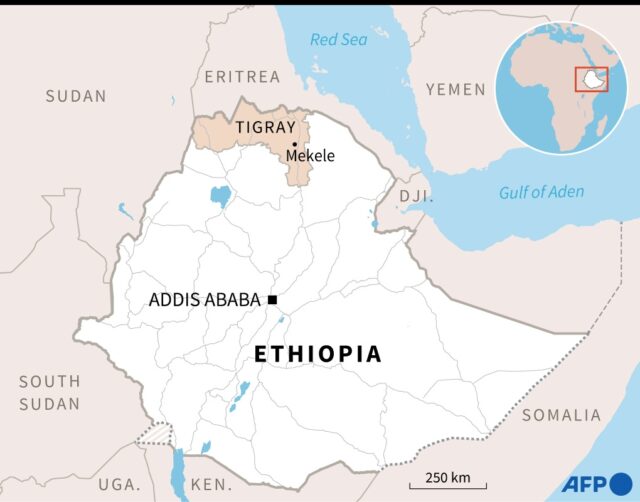Ethiopia said Tuesday its forces had seized three towns in Tigray, the latest major battleground shift in the brutal war, as the UN warned the situation was spiralling out of control with an “utterly staggering” toll on civilians.
International calls for a halt to escalating violence in Tigray have been mounting since a failed attempt by the African Union earlier this month to bring the warring sides to the negotiating table.
“The ENDF (Ethiopian National Defence Force) has taken control of the towns of Shire, Alamata and Korem without fighting in urban areas,” the government said in a statement.
It was the latest twist in the two-year conflict pitting federal forces and their allies against the Tigray People’s Liberation Front (TPLF) that has been marked by several dramatic about-turns.
Tuesday’s announcement by Prime Minister Abiy Ahmed’s government was issued after the Tigray Central Command said the strategic city of Shire and other areas had fallen to “invading forces”.
Troops from Ethiopia and neighbouring Eritrea had been waging an offensive near Shire for several days, triggering international alarm over the human cost of the renewed combat in Tigray.
Shire, home to about 100,000 people before the conflict began, is around 300 kilometres (180 miles) by road northwest of Tigray’s capital Mekele. Korem and Alamata lie about 180 kilometres south of Mekele.
The Tigrayan statement said artillery strikes by their rivals had killed or injured many civilians, and sent hundreds of thousands fleeing.
It is not possible to verify such claims as Tigray is under a communications blackout and access to northern Ethiopia is restricted.
‘Alarming levels’ of violence
Fighting resumed between pro-government forces and the TPLF in late August, with both blaming the other for shattering a five-month truce that had allowed limited amounts of aid into Tigray and raised a glimmer of hope for peace.
On Monday, UN Secretary General Antonio Guterres warned that the situation was “spiralling out of control”.
“Violence and destruction have reached alarming levels,” he said, calling for the “immediate withdrawal and disengagement” of Eritrean forces.
The European Union, the United States and the AU have also issued urgent appeals for a halt to the fighting, which is threatening the stability of the continent’s second most populous nation and the wider Horn of Africa region.
Washington and Brussels have voiced particular concern about the presence of troops from Eritrea, whose forces were accused of brutal atrocities during the early phase of the war that first erupted in November 2020.
Over two years, untold numbers of civilians have been killed, an estimated two million people driven from their homes while millions more are in need of aid, according to UN figures.
Tigray and its six million people are virtually cut off from the outside world, facing dire shortages of fuel, food and medicines and lacking basic services, including communications and electricity.
‘Risk of escalation’
Abiy’s government had said in a statement Monday it was committed to AU-led peace talks, without addressing a call by the bloc for a ceasefire.
But it accused the TPLF of colluding with unnamed “hostile foreign powers” and said it would pursue “defensive measures” including taking control of all airports and other federal sites in the region.
On Tuesday, Abiy’s national security adviser Redwan Hussein insisted on Twitter that the conflict was not “spiralling… Now it’s just being extinguished and degenerating”.
But the UN’s new high commissioner for human rights, Volker Turk, warned of a “significant risk of escalation” as more troops and soldiers were mobilised.
Air and artillery strikes in Tigray since August have inflicted an “utterly staggering” toll on civilians, he said in a statement issued in Geneva.
UN human rights office spokesperson Ravina Shamdasani said since August 31 the agency had documented at least 31 civilians killed, including children, and 73 wounded in 14 air strikes by the Ethiopian air force in Tigray.
Among those killed in a recent attack was a staff member of the International Rescue Committee aid group, who was part of a team delivering humanitarian assistance to pregnant women and malnourished children.
“Under international law, indiscriminate attacks or attacks deliberately targeting civilians or civilian objects amount to war crimes,” Turk said.
Almost 40,000 inhabitants of the Afar region have been displaced recently by fighting on the border with Tigray, according to the latest situation report by the UN’s humanitarian agency OCHA.

COMMENTS
Please let us know if you're having issues with commenting.